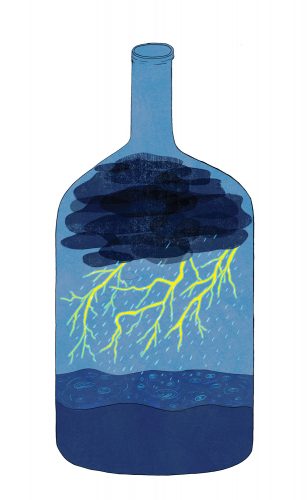
If you’ve ever talked about capturing and using the plentiful rainwater here in Oregon, someone has probably told you that it’s illegal.
That would be wrong. It’s perfectly legal, providing you catch the rainwater off of an artificial, impervious surface, according to Michael Mattick, the Oregon Water Resources Department’s watermaster for district 2, which includes Lane County.
Watermasters regulate water use during shortages, mediate disputes between water users and provide water rights information to landowners, among myriad other water-supply oriented duties.
Mattick points to a Jackson County case in which a landowner was jailed for storing rainwater that he didn’t have permits for as the source of the rumors that Oregon doesn’t allow rainwater catchment. In that case the landowner, Gary Harrington, built three reservoirs with dams so large they can be seen from high-elevation aerial photos, he says.
According to the Medford Mail-Tribune, Harrington’s illegal reservoirs were storing enough water “to fill 20 Olympic-sized swimming pools.”
Once the water hits the ground, Mattick says, it’s public water, and someone else might be expecting it. In other words, landowners nearby might have had the right to the water Harrington was storing and weren’t getting it. As hard as it is to believe that rainy Oregon has a limited water supply, water is not an unlimited resource.
But harvesting rainwater, when done correctly, has big green benefits. It can do anything from decreasing the volume and rate of stormwater runoff and its associated water pollution, recharging groundwater when it’s used for irrigation, and conserving energy, says Stephanie Scafa of the city of Eugene’s waste prevention and green building program.
She says rainwater harvesting is specifically “a strategy of capturing rain, storing it over time and re-using it on-site. Rainwater systems can be as simple as putting rain barrels under gutter downspouts, or as complex as constructing an underground cistern and water pump system.”
Mattick says that after rainwater harvesting became a legal issue in Colorado in the 1990s — it was illegal to collect rainwater in barrels there until 2016 — Oregon was motivated to amend its own laws. “Prior to that it didn’t say anything about collecting rainwater,” he says of the Oregon law. “It was just silent.”
So under Oregon law since about 1995, you can collect rainwater, but you have to collect it off an artificial, impervious surface, like a roof or a parking lot. You can’t build a dam or dig a big hole and catch rainwater and store it, but you could technically cover 10-acre parking lot in plastic sheeting, catch that rainwater in barrels and be good to go.
Scafa says, “Rain is a naturally soft water and does not contain harmful minerals, chlorine and other chemicals, and plants respond well to it.” And, she points out, once you have a rainwater system set up, the water is free and it conserves energy “because water from a centralized municipal system must be pumped throughout a vast service area before it can be piped to your house.”
Before designing and investing in a rainwater harvesting system, Scafa says, “you should consider Eugene’s dry summer climate, your intended uses for rainwater and your site capacity for collecting rainwater.”
You also need to consider protecting the public water supply from potential contamination originating in your rainwater harvesting system, she says.
And some rainwater systems require permits. Scafa says that small residential rainwater harvesting systems of less than 5,000 gallons generally don’t require a permit if they’re “used for outside irrigation only and do not alter the existing private stormwater system,” though she adds that such systems may require a plumbing permit. Larger or more complex systems used for irrigation may require a building permit and stormwater review.
Indoor water that you plan to use for flushing toilets and clothes washing needs plumbing, electrical and possibly building permits if you install a cistern or underground tank. For potable, aka drinking water, you need all those permits and you must treat the water to federal safe drinking water standards and meeting standards set by the Oregon Building Codes Division, Scafa says.
To learn more about catching rainwater and using it in a rain garden, Scafa recommends checking out the Water Wise Demonstration Garden in Alton Baker Park next to Nearby Nature’s Park Host Residence and the community garden at 622 Day Island Road. And for more info on permits and other considerations, go to eugene-or.gov/877/Water-Reduction-and-Reuse.